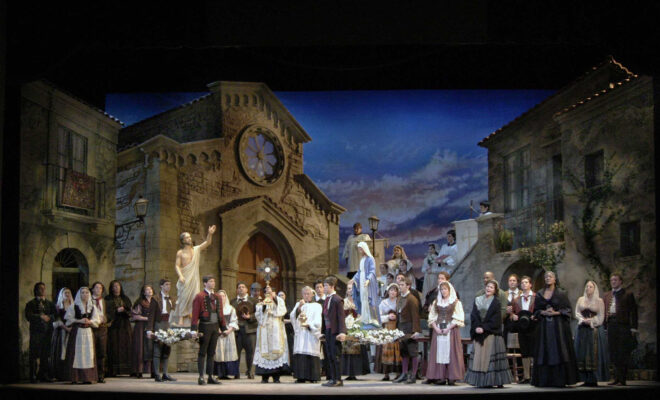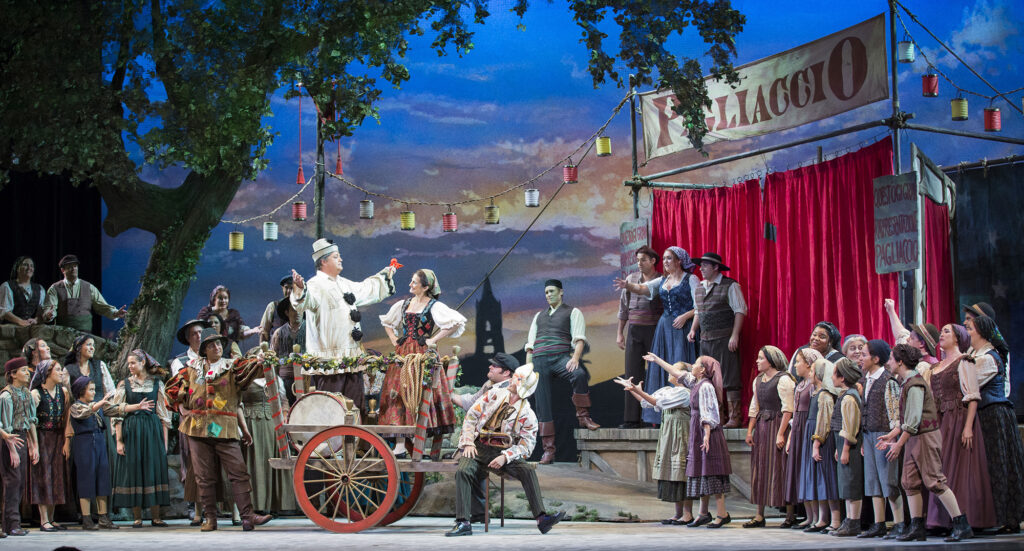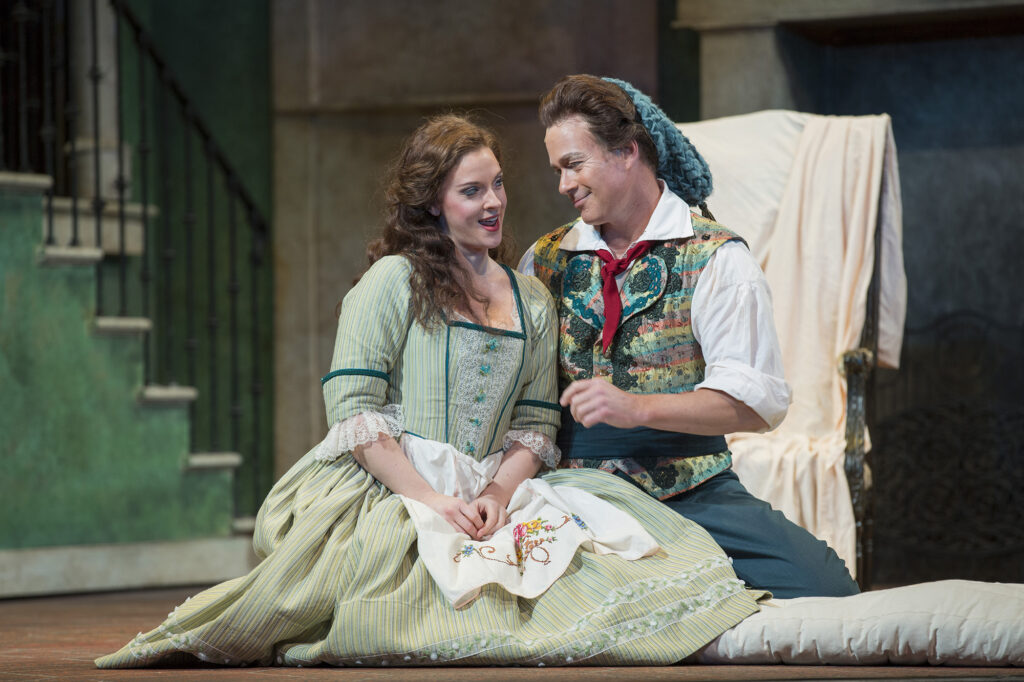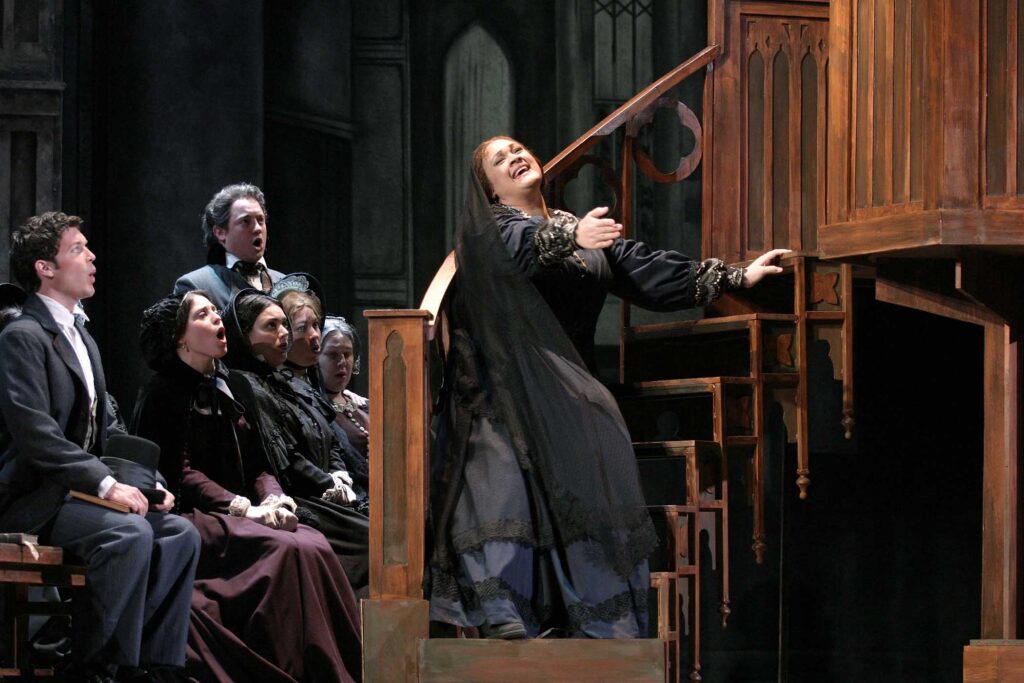
Feature
Sarasota Opera’s Winter Opera Festival: ‘Enter a Different World’
By Scott Ferguson | Photos Courtesy of Sarasota Opera | January 2025
When Victor DeRenzi lived in New York City, he often rode the subway to opera performances. The trip was relatively short, but the destination transported him to faraway places. “At the opera, I was suddenly in Spain, or Egypt, or Paris,” he says. “I became interested in opera because it was my chance to go someplace else, to enter a different world. That’s one of the many things opera can do.”
Now in his 43rd season as Artistic Director and Principal Conductor of Sarasota Opera, Maestro DeRenzi and his colleagues bring the living art of opera to devoted audiences, taking them on a musical journey far beyond the Sarasota Opera House’s downtown location and their everyday lives in the 21st century.
“I want audiences to enter not just the period that an opera takes place,” says DeRenzi, “I want them to enter the lives of the characters.”
One of opera’s most famous characters, the tragic clown Canio in Ruggero Leoncavallo’s Pagliacci (“Clowns”), takes operagoers to 19th century Italy, and the stage of the comedy acting troupe he leads. The production is on a double bill with Pietro Mascagni’s Cavalleria rusticana (“Rustic Chivalry”), with which it is frequently paired. In that story, a man returns to his village after military service, to find that his fiancée has married someone else. Both operas feature raw passion, betrayed lovers, violent revenge — and of course, great music.
“These two short operas (about an hour and 15 minutes each) are similar in subject matter and musical style,” explains Sarasota Opera General Director Richard Russell. “The style is known as verismo, which is kind of a gritty reality, both in the music and the story.

“They’re about simple people — the country folk — so they complement each other well. They premiered within a couple of years of each other; Mascagni’s Cavalleria rusticana came first and was a worldwide success. Leoncavallo, who was a struggling composer at that time, knew of that success and decided to write a similar kind of piece. Withing two years, his Pagliacci premiered. Soon after, the two operas were paired, and since then, it’s almost inevitable that you’ll see them together.”
The next opera in the winter lineup takes audiences to Spain — Rossini’s “opera buffa” (comic opera), The Barber of Seville. In the story, Count Almaviva yearns to win the heart of the beautiful Rosina. He gets assistance from the title character (the barber Figaro) to steal her away from her guardian, the elderly Bartolo.

“Our third production in the Winter Festival, Mozart’s The Marriage of Figaro, is the sequel to The Barber of Seville,” says DeRenzi, “although it premiered 30 years earlier. Rossini’s opera is about when the Count and Rosina first meet and how, of course, they will live happily ever after. The Marriage of Figaro is set a few years later. It turns out they’re not living happily ever after,” he adds wryly, “but luckily their marriage is saved by Mozart’s incredible music.”
Surprisingly, Russell says The Barber of Seville and The Marriage of Figaro are not often performed in the same opera season.
“It’s very rare for a company our size to stage them both in a season as we are doing,” he says. “The Metropolitan Opera has performed both operas in the same season, but they’re doing 18 or 20 works a season. When a company like ours is doing four operas in a season, you don’t usually see them together. We decided to do them because of the timing of when we had last staged them (2018 for The Barber of Seville and 2015 for The Marriage of Figaro), but also just because it made sense and it was an interesting idea.”
Closing the Winter Festival is a return to Italy for Giuseppe Verdi’s Stiffelio. The title character, a Protestant minister, returns from a mission abroad to discover that his wife has been unfaithful. He faces his wife’s transgressions, but his human emotions compete with his strong religious faith.
“We have a long-term commitment to the operas of Verdi,” says DeRenzi, referring to the Verdi Cycle, a 27-year project of the Sarasota Opera to perform all of Verdi’s works. Begun in 1989, it was completed in 2016. Sarasota Opera continues to present a Verdi opera every season. Stiffelio was last staged by the company in 2005.

“Stiffelio has an interesting history,” says DeRenzi. “It depicts a married minister. The last scene of the opera quotes the Bible about forgiveness, presented in the opera in the context of adultery. That did not pass the Italian censors easily. Verdi decided to revise Stiffelio about five years later. Once he did, he claimed that the original opera was destroyed, and should only be performed as it was revised.”
The revised version, which Verdi titled Aroldo, was presented by Sarasota Opera in 1990 as part of the Verdi Cycle.
“The original Stiffelio was not performed between the 1850s and 1968,” DeRenzi notes, “when a manuscript of the opera was found in a library in Naples, Italy. Stiffelio was written at the time Verdi wrote some of his greatest operas, such as Rigoletto and La Traviata, but it was unknown for many years. Its discovery was like finding Beethoven’s Symphony number five and a half.
“Stiffelio was staged often in the 1990s, but it’s not done as much anymore. It fills a need for us so that our out-of-town audiences can come and see an opera that they may not be able to see in their hometown, or in New York or Chicago or other opera centers. But most of all it is a compelling drama for all our audience, be they long time opera lovers or new to the art.”
The 2025 Winter Festival continues Sarasota Opera’s commitment “to present opera in a way that is impassioned and faithful to the composers’ intentions,” as DeRenzi wrote in his artistic director’s message in the season program.
Russell notes that Opera America, a national service organization that supports the creation and presentation of opera, did a survey of opera audiences among a wide variety of 36 U.S. opera companies, polling 190,000 operagoers who had attended any virtual or in-person opera event between 2020 and 2024.
“Since Covid, a lot of opera companies are seeing a lot of new audiences,” says Russell. “So Opera America wanted to understand what draws people to the opera today and how to keep them coming. It turns out that overwhelmingly, people want to come to traditional operas in traditional productions. And we’re seeing that with our new and returning patrons. I think when they have the opportunity to be immersed in an authentic experience — which is what we provide here at Sarasota Opera — it draws in longtime opera lovers as well as new people discovering the joy of live opera.”
“We are not doing opera just for today,” DeRenzi adds. “We’re doing it to continue building an audience, so there will always be live opera and an audience to see it.”
Operas in the 2025 Winter Festival
The 2025 Sarasota Opera Winter Festival runs from mid-February through the end of March. All the operas are sung in Italian with English translations.
February 15-March 29: Cavalleria rusticana, opera in one act. Music by Pietro Mascagni, Libretto by Giovanni Targioni-Tozzetti & Guido Menasci; Pagliacci, opera in a prologue and two acts, Music & Libretto by Ruggero Leoncavallo
February 22-March 29: The Barber of Seville, opera in two acts, Music by Gioachino Rossini, Libretto by Cesare Sterbini
March 8-28: The Marriage of Figaro, opera in four acts, Music by Wolfgang Amadeus Mozart/Libretto by Lorenzo Da Ponte
March 15-30: Stiffelio, opera in three acts, Music by Giuseppe Verdi, Poetry by Francesco Maria Piave
For tickets and information, visit SarasotaOpera.org or call the box office at 941-328-1300.



You must be logged in to post a comment Login